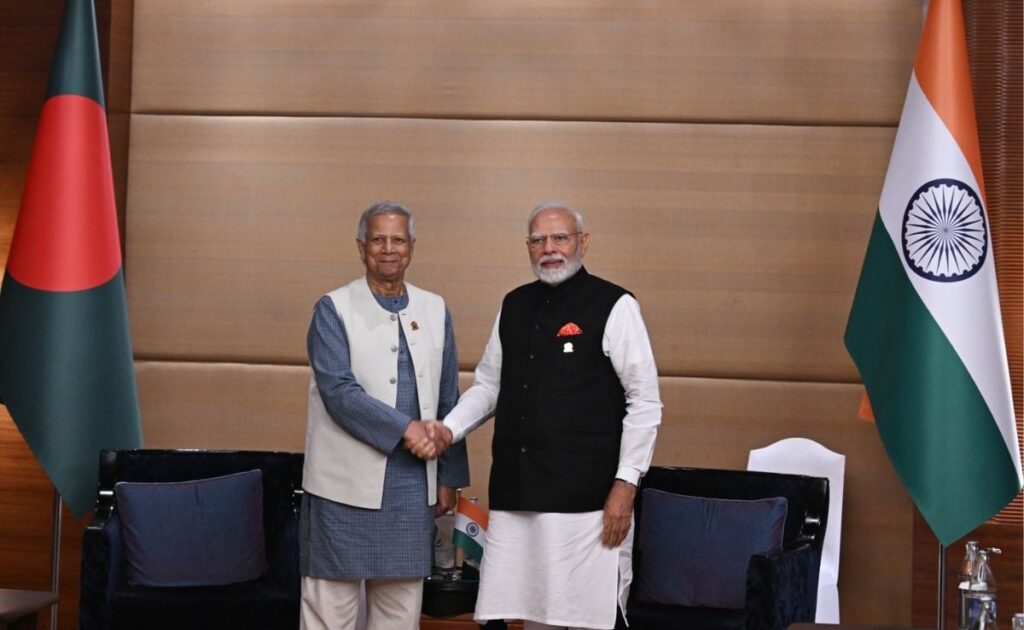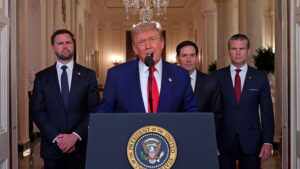PM Modi Meets Bangladesh's M Yunus For The First Time Since Regime Change


Prime Minister Narendra Modi and Muhammad Yunus, chief advisor of Bangladesh’s interim government, met on the sidelines of the BIMSTEC Summit in Bangkok today. External Affairs Minister S Jaishankar and National Security Advisor Ajit Doval were also present.
This is the first meeting between the two leaders since Nobel laureate Yunus took charge of Bangladesh following the ouster of the Sheikh Hasina government in August last year. The meeting assumes significance amid Dhaka’s growing closeness with Beijing, a development Delhi has been watching closely.
Relations between Delhi and Dhaka have taken a frosty turn since the Sheikh Hasina-led Awami League government was overthrown after a nationwide movement and an interim government took over. The former Prime Minister fled to India. In the months following the change of guard, India expressed concerns over reports of attacks on minorities in Bangladesh. Dhaka has stressed that “Bangladesh’s minorities are Bangladesh’s issue”.
Mr Yunus’ recent remarks on the Northeastern states in India stoked tensions between the two countries and drew strong responses from the region’s leaders. A video of Mr Yunus’s remarks, apparently made during his four-day trip to China, shows him saying, “The seven states of India, the eastern part of India, are called the seven sisters. They are a landlocked region of India. They have no way to reach out to the ocean.” He says Bangladesh is the “guardian of the ocean” for the region. “This opens up a huge possibility. This could be an extension for the Chinese economy,” he said.
Reacting to the remarks, Assam Chief Minister Himanta Biswa Sarma said what the Bangladesh leader had said was “offensive”. He stressed the need to develop more robust rail and road networks connecting the Northeast to the rest of the country.
“The statement made by Md Younis of Bangladesh so called interim Government referring to the seven sister states of Northeast India as landlocked and positioning Bangladesh as their guardian of ocean access, is offensive and strongly condemnable. This remark underscores the persistent vulnerability narrative associated with India’s strategic ‘Chicken’s Neck’ corridor.” The Chicken’s Neck Corridor is a stretch of land in West Bengal’s Siliguri which connects the region to the rest of India. Nepal, Bangladesh and Bhutan surround this stretch.
“Historically, even internal elements within India have dangerously suggested severing this critical passageway to isolate the Northeast from the mainland physically. Therefore, it is imperative to develop more robust railway and road networks both underneath and around the Chicken’s Neck corridor. Additionally, exploring alternative road routes connecting the Northeast to mainland India, effectively bypassing the Chicken’s Neck, should be prioritised,” Mr Sarma said.
“Though this may pose significant engineering challenges, it is achievable with determination and innovation. Such provocative statements by Md Younis must not be taken lightly, as they reflect deeper strategic considerations and longstanding agendas,” he added.
Earlier, Prime Minister Modi wrote to Mr Yunus on March 26, wishing Bangladesh on its independence day. In his letter, the Prime Minister highlighted the significance of mutual sensitivity and said the Bangladesh Liberation War is a “shared history” between the two countries. “We remain committed to advancing this partnership, driven by our common aspirations for peace, stability, and prosperity, and based on mutual sensitivity to each other’s interests and concerns,” he wrote.






